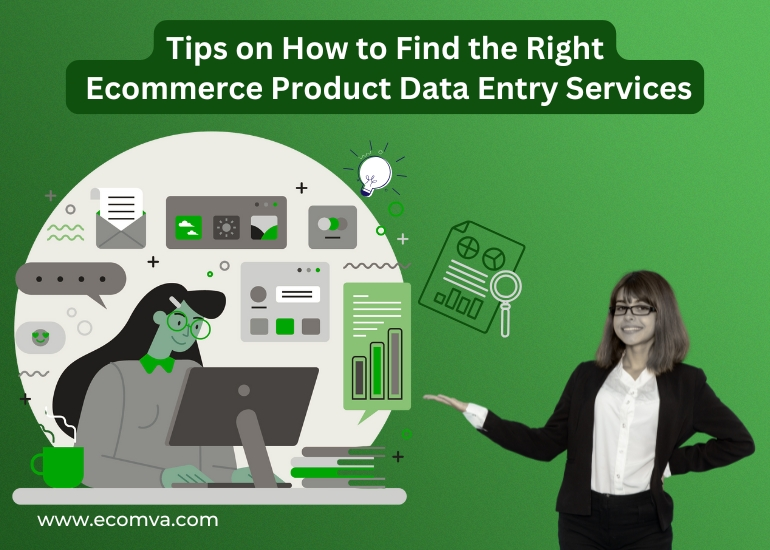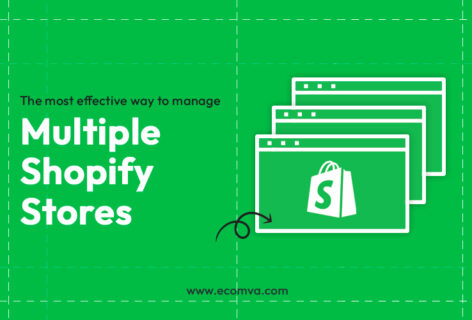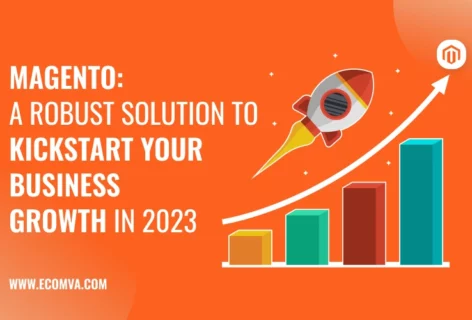Tips on How to Find the Right Ecommerce Product Data Entry Services

Shoppers make decisions in seconds, often based on how a product looks and what details are available at first glance. When an image is wrong, a specification is missing, or the product appears under the wrong category, it breaks trust and drives people away.
This is why clear product data, including accurate titles, consistent formatting, and complete descriptions, plays a direct role in how your store performs. It affects search visibility, customer confidence, and ultimately, conversions.
But keeping that level of consistency across dozens or thousands of products isn’t easy. It takes time, attention to detail, and a structured process. It is something many stores struggle to maintain while juggling other parts of the business.
That’s where Ecommerce Product Data Entry Services can make a difference. If you’re planning to bring in support, here’s how to find a provider that can manage the work without slowing down your operations or creating new issues.
How to Find the Right Ecommerce Data Entry Services?
1. Industry Experience Should Match Your Business Type
The first thing to check is whether the team has worked with businesses similar to yours. Product entry isn’t the same for every store. A store selling fashion items has different formatting and tagging needs than one selling industrial tools. Look for providers who have handled a range of categories and platforms.
- Have they worked with both small and large catalogs?
- Do they understand how configurable or grouped products work on your platform?
When experience matches your niche, the errors are fewer, and workflows become faster.
2. Ask for a Clear Process Overview
Professionals offering ecommerce product data entry services should have a system. You should know how they accept data, clean it, and upload it to your store. Teams that work without structure often cause delays or make critical mistakes.
Here’s a sample of what a strong data entry SOP might look like:
| Step | What It Covers |
|---|---|
| Data Collection | Product sheets, manufacturer specs, images |
| Data Formatting | Clean up, consistency, attribute mapping |
| Entry & Upload | Add to store backend or through CSV import |
| QA Check | Spot checks, SKU checks, image validations |
| Client Review | Optional checkpoint before final upload |
This shows the provider is organized and understands what goes into the job.
3. Check Their Approach to Quality Control
If a product name is entered incorrectly or an image is broken, it reflects poorly on your brand. Ask how the provider ensures accuracy. Some have internal reviewers, others use error-flagging tools. A dependable team never leaves product uploads unchecked.
You can also ask about the percentage of returns or corrections from past clients. It’s a valid way to measure their attention to detail.
4. Compare Their Pricing Structures
Pricing models differ across providers. Some charge per product, while others charge hourly or by volume. Knowing your budget and catalog size will help here.
Here’s a quick comparison:
| Model | Best For | Example Rate |
|---|---|---|
| Per Product | Small/medium catalogs | $0.25–$0.50 per product |
| Hourly | Ongoing tasks, varied scope | $6–$12 per hour |
| Monthly Flat Rate | Large projects with stable requirements | $400–$1,000/month |
For high-SKU stores, it’s worth asking if they support bulk product data entry services to avoid paying product-by-product.
5. Make Sure They Work with Your Tech Stack
eCommerce platforms are not all the same. The data entry team must know how to handle your specific system. Whether it’s Shopify, WooCommerce, Magento, or BigCommerce, they should be familiar with the backend, import/export functions, and CSV requirements.
If you’re using custom integrations or PIM (Product Information Management) tools, mention that early in your conversations.
6. Look for Bulk Upload Experience
Some teams are great with manual uploads, but struggle when you need to add or update thousands of listings. If your catalog includes 5,000+ SKUs, you’ll need a provider that supports bulk product data entry services and understands how to handle product variations, price tiers, and large-scale updates without errors.
7. Ask About Product Listing Support
Data entry and product listing are two related but distinct tasks. You want a team that can help with both when needed. That includes assigning categories, writing short descriptions, filling meta fields, and even tagging images.
A provider that also offers ecommerce product listing services can help streamline your entire process.
8. Don’t Skip the Security Conversation
You’ll likely be sharing confidential data — pricing, product costs, images, supplier info. Confirm that the data entry outsourcing company has NDAs in place and follows proper data security protocols.
Look for:
- Secure file sharing methods
- Controlled access for teams
- Regular backups
This is essential for businesses operating in regulated industries.
9. Can They Scale During Peak Seasons?
During holiday seasons or sales events, product updates increase. Can their team handle a sudden jump in workload? Do they offer flexible bandwidth or dedicated team members?
A good data entry outsourcing company won’t let delays impact your launch calendar. They’ll be ready to scale when needed.
10. Don’t Ignore Past Work and Testimonials
Reputation matters. Ask for case studies and previous client feedback. Do a background check online. Many businesses skip this and end up hiring teams with poor support.
Real reviews will tell you more than a service page ever will.
11. Virtual Assistants Can Offer More Than Just Entry
Sometimes you don’t just need data input — you also need catalog updates, stock monitoring, pricing corrections, and even customer support. In that case, hiring a virtual assistant who can outsource ecommerce data entry and handle broader eCommerce admin tasks is more useful than hiring for entry alone.
Look for teams offering virtual support, not just spreadsheet work.
12. Do They Offer Marketing Tool Integration Help?
Some providers also help with setting up marketing tools connected to your product catalog, like Klaviyo or DotDigital.
If you’re managing your campaigns using platforms like Klaviyo, it helps to work with teams who can connect your product data with the Best Email Automation Service for targeted flows and abandoned cart recovery.
Let Experts Handle Your Product Data Work!
Hiring the right team for ecommerce product data entry services can make all the difference in how smoothly your online store operates. When your product data is entered correctly, your store loads faster, customers find what they’re looking for, and your catalog stays error-free. If you’ve been spending hours on manual uploads, dealing with messy spreadsheets, or correcting mistakes from rushed uploads, it might be time to delegate.
At EcomVA, we offer skilled support for businesses that want reliable and accurate product data entry. You can hire a data entry virtual assistant trained to handle product uploads, catalog updates, bulk imports, and ongoing listing management.
Whether you’re managing a store on Shopify, Adobe Commerce, BigCommerce, or another major platform, our team is ready to assist. From Shopify store management and Adobe Commerce store management to bulk product uploads, we make sure your product data stays organised and consistent.
We’ve helped hundreds of eCommerce businesses with tasks like:
- Managing large product catalogs with thousands of SKUs
- Performing fast and clean bulk product data entry services
- Cleaning up existing listings and adding missing information
- Handling ecommerce product listing services from start to finish
- Providing ongoing support through our store management virtual assistant services
Instead of managing the day-to-day data tasks yourself, let a trained expert do it. You’ll save time, reduce errors, and keep your store running the way it should.
Request a consultation to learn more about how to outsource ecommerce data entry with EcomVA — a trusted data entry outsourcing company that knows the ins and outs of online store operations.
FAQs
1. What should I prepare before working with a data entry virtual assistant?
It’s helpful to have your product data organised before onboarding begins. This might include spreadsheets with product information, access to your eCommerce platform, naming conventions, and any style or formatting guidelines your store follows. Sharing examples of existing listings can also give the assistant a clear understanding of your expectations.
2. Can I get help with fixing past product entry errors done by my in-house team or freelancers?
Yes. Many ecommerce product data entry services include catalog clean-up and error correction. This may involve fixing broken links, removing duplicates, correcting attribute mismatches, and standardising inconsistent formats.
3. Do I need to give full backend access to my store for data entry support?
Not always. Depending on your comfort level, providers can work through limited-access roles, shared drives with import sheets, or third-party integrations. Discuss access control preferences upfront with your provider.
4. How do I know if I need ongoing support or just one-time data entry help?
If you frequently add or update products, run seasonal promotions, or sync multiple supplier feeds, ongoing support is a better fit. If you’re launching a new store or doing a catalog overhaul, a one-time service may be sufficient.
5. Will the virtual assistant also help with uploading content for SEO, such as meta titles and descriptions?
Some data entry teams also support basic SEO elements as part of their ecommerce product listing services, including adding meta titles, descriptions, alt text, and tags. Be sure to confirm the scope of this during your consultation, as not all providers include it by default.







